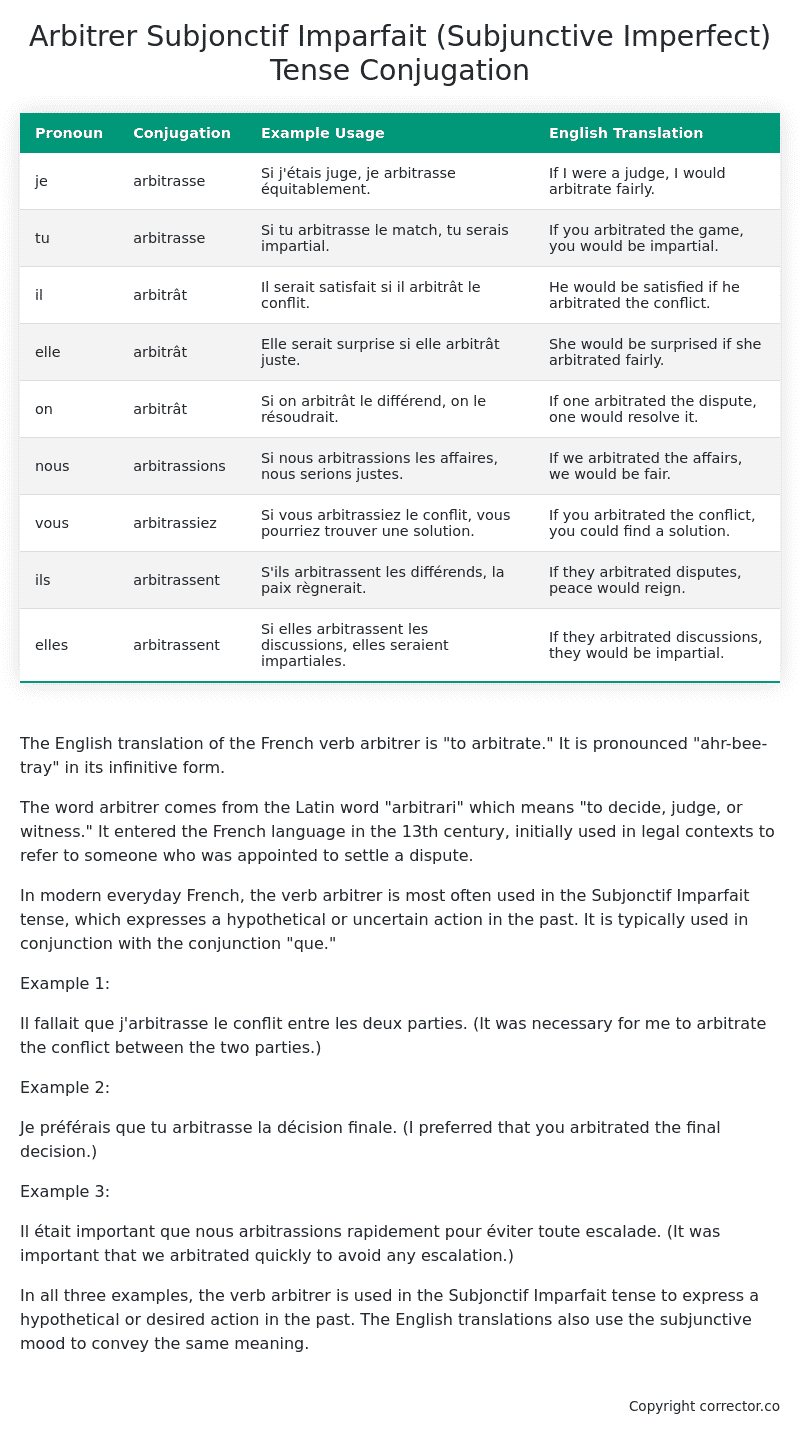Subjonctif Imparfait (Subjunctive Imperfect) Tense Conjugation of the French Verb arbitrer
Introduction to the verb arbitrer
The English translation of the French verb arbitrer is “to arbitrate.” It is pronounced “ahr-bee-tray” in its infinitive form.
The word arbitrer comes from the Latin word “arbitrari” which means “to decide, judge, or witness.” It entered the French language in the 13th century, initially used in legal contexts to refer to someone who was appointed to settle a dispute.
In modern everyday French, the verb arbitrer is most often used in the Subjonctif Imparfait tense, which expresses a hypothetical or uncertain action in the past. It is typically used in conjunction with the conjunction “que.”
Example 1:
Il fallait que j’arbitrasse le conflit entre les deux parties.
(It was necessary for me to arbitrate the conflict between the two parties.)
Example 2:
Je préférais que tu arbitrasse la décision finale.
(I preferred that you arbitrated the final decision.)
Example 3:
Il était important que nous arbitrassions rapidement pour éviter toute escalade.
(It was important that we arbitrated quickly to avoid any escalation.)
In all three examples, the verb arbitrer is used in the Subjonctif Imparfait tense to express a hypothetical or desired action in the past. The English translations also use the subjunctive mood to convey the same meaning.
Table of the Subjonctif Imparfait (Subjunctive Imperfect) Tense Conjugation of arbitrer
| Pronoun | Conjugation | Example Usage | English Translation |
|---|---|---|---|
| je | arbitrasse | Si j’étais juge, je arbitrasse équitablement. | If I were a judge, I would arbitrate fairly. |
| tu | arbitrasse | Si tu arbitrasse le match, tu serais impartial. | If you arbitrated the game, you would be impartial. |
| il | arbitrât | Il serait satisfait si il arbitrât le conflit. | He would be satisfied if he arbitrated the conflict. |
| elle | arbitrât | Elle serait surprise si elle arbitrât juste. | She would be surprised if she arbitrated fairly. |
| on | arbitrât | Si on arbitrât le différend, on le résoudrait. | If one arbitrated the dispute, one would resolve it. |
| nous | arbitrassions | Si nous arbitrassions les affaires, nous serions justes. | If we arbitrated the affairs, we would be fair. |
| vous | arbitrassiez | Si vous arbitrassiez le conflit, vous pourriez trouver une solution. | If you arbitrated the conflict, you could find a solution. |
| ils | arbitrassent | S’ils arbitrassent les différends, la paix règnerait. | If they arbitrated disputes, peace would reign. |
| elles | arbitrassent | Si elles arbitrassent les discussions, elles seraient impartiales. | If they arbitrated discussions, they would be impartial. |
Other Conjugations for Arbitrer.
Le Present (Present Tense) Conjugation of the French Verb arbitrer
Imparfait (Imperfect) Tense Conjugation of the French Verb arbitrer
Passé Simple (Simple Past) Tense Conjugation of the French Verb arbitrer
Passé Composé (Present Perfect) Tense Conjugation of the French Verb arbitrer
Futur Simple (Simple Future) Tense Conjugation of the French Verb arbitrer
Futur Proche (Near Future) Tense Conjugation of the French Verb arbitrer
Plus-que-parfait (Pluperfect) Tense Conjugation of the French Verb arbitrer
Passé Antérieur (Past Anterior) Tense Conjugation of the French Verb arbitrer
Futur Antérieur (Future Anterior) Tense Conjugation of the French Verb arbitrer
Subjonctif Présent (Subjunctive Present) Tense Conjugation of the French Verb arbitrer
Subjonctif Passé (Subjunctive Past) Tense Conjugation of the French Verb arbitrer
Subjonctif Imparfait (Subjunctive Imperfect) Tense Conjugation of the French Verb arbitrer (this article)
Subjonctif Plus-que-parfait (Subjunctive Pluperfect) Tense Conjugation of the French Verb arbitrer
Conditionnel Présent (Conditional Present) Tense Conjugation of the French Verb arbitrer
Conditionnel Passé (Conditional Past) Tense Conjugation of the French Verb arbitrer
L’impératif Présent (Imperative Present) Tense Conjugation of the French Verb arbitrer
L’infinitif Présent (Infinitive Present) Tense Conjugation of the French Verb arbitrer
Struggling with French verbs or the language in general? Why not use our free French Grammar Checker – no registration required!
Get a FREE Download Study Sheet of this Conjugation 🔥
Simply right click the image below, click “save image” and get your free reference for the arbitrer Subjonctif Imparfait tense conjugation!

Arbitrer – About the French Subjonctif Imparfait (Subjunctive Imperfect) Tense
Formation
Common Everyday Usage Patterns
Interactions with Other Tenses
Subjonctif Présent
Indicatif Passé Composé
Conditional
Conditional Perfect
Summary
I hope you enjoyed this article on the verb arbitrer. Still in a learning mood? Check out another TOTALLY random French verb conjugation!


